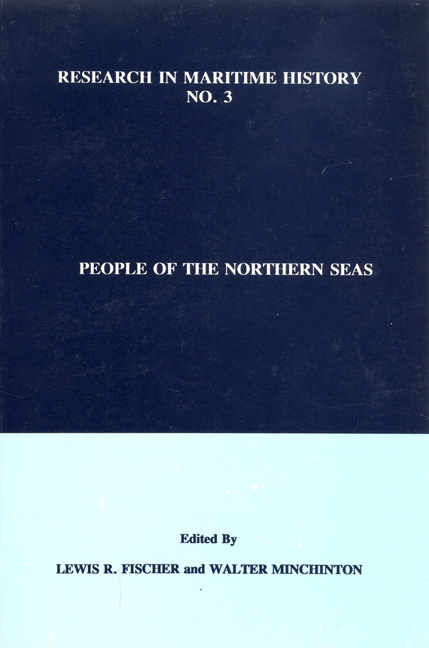Book contents
- Frontmatter
- Contents
- About the Editors
- Contributors
- General Introduction
- “Une Petite Republique” in Southwestern Newfoundland: The Limits of Imperial Authority in a Remote Maritime Environment”
- “Changes in Aleut Communities Following Russian Contact”
- “Five Years Before the Mast: Observations on the Conditions of Maritime Labour in Finland and Elsewhere”
- “Expressions of Longing, Sources of Anxiety? The Significance of Contacts with Home for Finnish Sailors in London and Hull in the Late Nineteenth Century”
- “Death of a Merchant”
- “St. Petersburg's Bills of Exchange in the Russian Economy of the Eighteenth Century”
- “Shipowners and Iron Sailing Ships: The First Twenty Years, 1838-1857”
- “The Growth of Norwegian Shipbroking: The Practices of Fearnley and Eger as a Case Study, 1869-1914”
- “Captain John Deane: Mercenary, Diplomat and Spy”
- “Her Majesty's Coastguard”
- “Coastal Life, ‘Nordic Culture’ and Nation State: Reflections on the Formation of the Nation State and Maritime History”
“Une Petite Republique” in Southwestern Newfoundland: The Limits of Imperial Authority in a Remote Maritime Environment”
- Frontmatter
- Contents
- About the Editors
- Contributors
- General Introduction
- “Une Petite Republique” in Southwestern Newfoundland: The Limits of Imperial Authority in a Remote Maritime Environment”
- “Changes in Aleut Communities Following Russian Contact”
- “Five Years Before the Mast: Observations on the Conditions of Maritime Labour in Finland and Elsewhere”
- “Expressions of Longing, Sources of Anxiety? The Significance of Contacts with Home for Finnish Sailors in London and Hull in the Late Nineteenth Century”
- “Death of a Merchant”
- “St. Petersburg's Bills of Exchange in the Russian Economy of the Eighteenth Century”
- “Shipowners and Iron Sailing Ships: The First Twenty Years, 1838-1857”
- “The Growth of Norwegian Shipbroking: The Practices of Fearnley and Eger as a Case Study, 1869-1914”
- “Captain John Deane: Mercenary, Diplomat and Spy”
- “Her Majesty's Coastguard”
- “Coastal Life, ‘Nordic Culture’ and Nation State: Reflections on the Formation of the Nation State and Maritime History”
Summary
Introduction
This paper continues earlier research into the origins and persistence of settlement by French and Irish fishermen at Codroy in southwestern Newfoundland from about 1725 until 1755. A previous paper identified the settlers as French fishermen whose lineage could be traced two generations back to fishing families living on the French coast of Newfoundland during the 1680s who were forced to abandon the island following the Treaty of Utrecht (1713) by which France acknowledged British sovereignty over the entire island. A subsequent paper identified one of the metropolitan French merchant families whose capital had maintained the earlier fishing stations in Newfoundland and who reappeared as traders and investors at the Codroy settlement during the 1730s and 1740s. This paper integrates the results of those earlier studies and extends the analysis beyond 1744, when the outbreak of war caused the abandonment of the Codroy settlement. The community was re-established in 1748, only to be destroyed a second time when hostilities between France and England resumed in 1755. When Codroy reappeared in 1762, it was as part of the British mercantile world, for the principal merchant was English. Though the social and economic character of the community after 1762 resembled the earlier pattern, the “French connection” had been broken. This history of a small fishing settlement, in which two French phases were followed by an English one, suggests certain conclusions about the principal factors governing the social and economic character of an isolated community of “people of the sea.” I argue that national differences were relatively insignificant, for the similarities between the earlier and later communities at Codroy were stronger than the disparities. The paper is based largely on manuscript and cartographic evidence gathered in the national and regional archives of littoral England and France.
The Persistence of French Settlement in Newfoundland (c. 1684-1744)
On 25 September 1714, the departure of the Héros from the little town of Plaisance in southern Newfoundland marked the end of an era. On board was Philippe Pastour de Costebelle, who had been governor of the French colony since 1695. In the negotiations that ended the War of the Spanish Succession in 1713, France had agreed to cede its fishing colony at Plaisance together with all claims to Newfoundland, even though she had been undefeated on the island.
- Type
- Chapter
- Information
- People of the Northern Seas , pp. 1 - 34Publisher: Liverpool University PressPrint publication year: 1992



